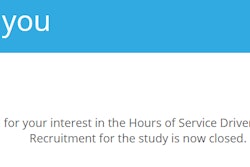
A bill introduced in the U.S. House this week would if passed further entrench the suspension of certain 2013 hours-of-service rules and block the DOT from proceeding with a rule to increase the minimum amount of liability insurance required of motor carriers.
The 2016 appropriations bill for the Department of Transportation and the Department of Housing and Urban Development was released April 28 and will be taken up by a House subcommittee this week, according to the House Appropriations Committee’s press release.
The $55 billion bill calls on the suspension of 2013’s 34-hour restart provisions (enforcement of which was halted by a 2015 appropriations bill passed in December) to stay in effect until the Federal Motor Carrier Safety Administration produces its required study of the rules, also required by the December-passed appropriations bill.
The suspended rules include the requirement that a 34-hour restart include two 1 a.m. to 5 a.m. periods and the once-per-week limit of the restart’s use.
The American Transportation Research Institute also unveiled April 29 a report concluding the 2013 rules increased crash numbers on U.S. roadways rather than lowering them. Click here to read Overdrive’s coverage.
The 2016 fiscal year appropriations bill better spells out reimplementation of the rules, too.
The legislation would only allow the 2013 restart rules to go back into effect if FMCSA’s report “establishes that…drivers who operated under the restart provisions…demonstrated statistically significant improvement in all outcomes related to safety, operator fatigue, driver health and longevity and work schedules” when compared to drivers operating under pre-2013 rules.

Per current law, the rollback will stay in effect until FMCSA produces its report or until Sept. 30, 2015 — whichever is later.
The bill, if passed, would also prevent FMCSA from taking any further action on a potential rule to increase the current $750,000 minimum amount of liability insurance required to be held by motor carriers.
The agency issued last November an Advanced Notice of Proposed Rulemaking seeking questions from industry stakeholders about the minimum and its effectiveness. The current limit was set in the 1980s, and safety groups — and FMCSA — have argued it needs to be increased to keep up with inflation and rising medical costs.
Trucking groups, however, contend that just 1 percent of all trucking-related accidents see claims above $750,000, and just a fraction of a percent see claims above $1 million.
The 2016 appropriations bill would also bar FMCSA from using appropriated funds to implement wireless roadside inspections until the DOT ensures Congressional appropriations committees that such inspections would not “conflict with existing non-federal electronic screening systems.”
Both chambers of Congress last year took up appropriations bills that blocked or hastened regulatory activity by FMCSA.
The only item that made it through Congress and to the White House, however, was the restart rollback.
The bill also designates $40 billion to the Highway Trust Fund, which funds highway and road construction projects.
Another surface transportation reauthorization bill is also expected in the coming weeks, even if only a stopgap measure to allow members of Congress more time to produce a long-term bill.











